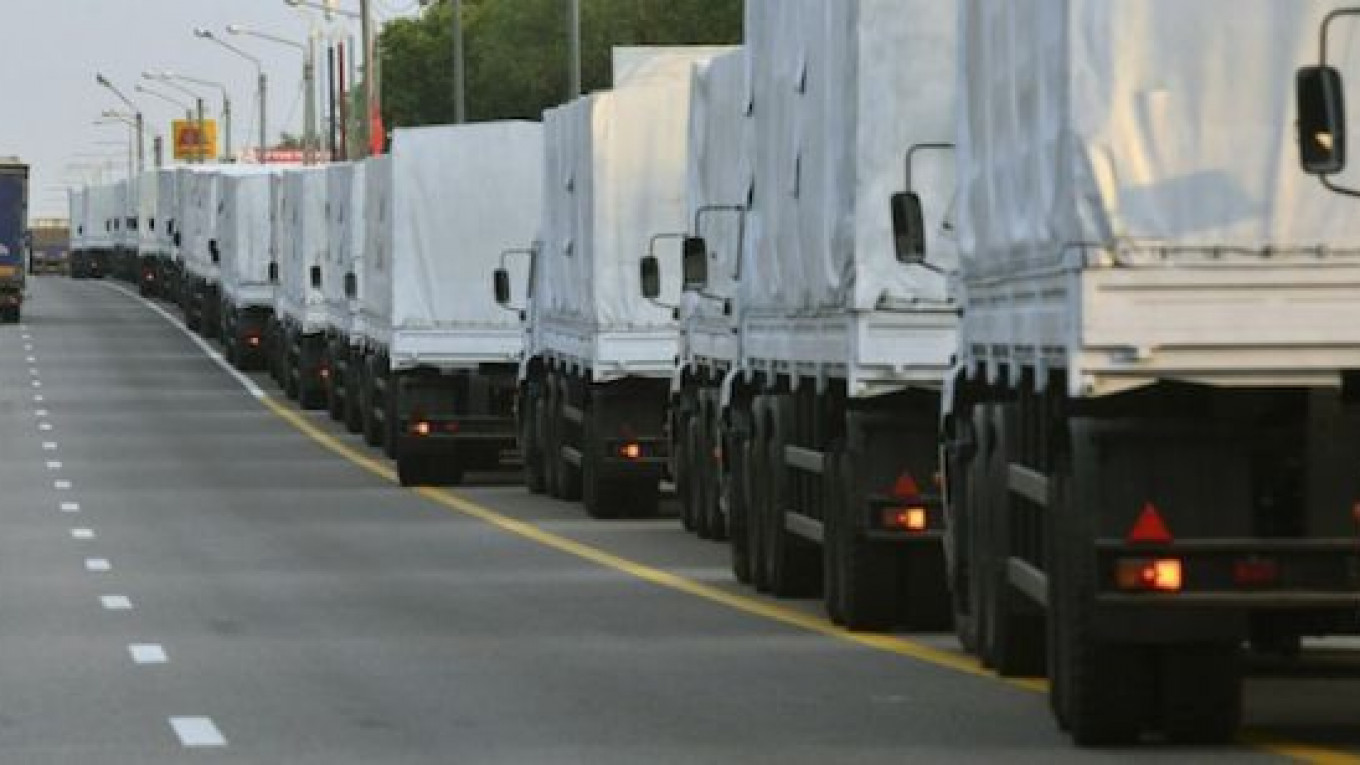BRUSSELS — Russian aid to eastern Ukraine must be vetted and distributed by the International Committee of the Red Cross (ICRC) to make sure it is not used for political ends, the European Union's humanitarian aid chief has said.
A Russian convoy carrying food, water and other aid set off on Tuesday for eastern Ukraine, but Kiev said it would not allow the vehicles to cross onto its territory.
Western governments have warned Moscow against any attempt to turn the operation into a military intervention by stealth.
"What we expect to see is full respect for international humanitarian law and for the principles of neutrality, impartiality, independence of the delivery of humanitarian aid," EU humanitarian aid commissioner Kristalina Georgieva said in an interview.
The ICRC, an independent aid agency, must assess what the Russian humanitarian aid consists of, and the ICRC must also distribute the aid to ensure it is handed out according to need, rather than the political leanings of the recipients, she said.
The Russian convoy must also respect Ukraine's sovereignty, said Georgieva, a Bulgarian who is seen as one of the candidates to succeed Britain's Catherine Ashton as EU foreign policy chief later this year.
"Ukraine has the right to know what is entering their territory," Georgieva said after announcing 2.5 million euros ($3.34 million) in EU aid for displaced people in eastern Ukraine.
The ICRC said Monday it had held talks with Ukrainian and Russian authorities on delivering the Russian aid and laid down strict guidelines to uphold its neutral role in conflicts.
Fears Over Winter
Georgieva said many civilians had fled the fighting in eastern Ukraine but those who remained faced "excruciatingly difficult conditions" with no electricity or water, scarce food and medical services that had practically collapsed.
She was worried that their plight would get worse if the conflict dragged on in to winter.
"We have seen it time and again in humanitarian crises that when weather comes on top of the conflict then, of course, a very weakened population is an easy prey to winter conditions."
Georgieva voiced hope that the EU and Russia could cooperate on the humanitarian effort in Ukraine, helping to rebuild trust.
The 28-nation EU has imposed sanctions on Moscow over its annexation of Ukraine's Crimea region and its support for separatist rebels in eastern Ukraine.
Georgieva, 60, a former World Bank official, said whoever replaced Ashton as the EU's foreign policy chief when her term ends in October would have to take a firm stance towards Russia.
Other names in the frame to succeed Ashton are Italian Foreign Minister Federica Mogherini and Polish Foreign Minister Radoslaw Sikorski.
"It is a great honour to be considered but let the member states make a decision. Whoever takes this position in an environment of so many crises with very dramatic impact needs to be enjoying the full support of member states," she said.
"It's a huge responsibility. If I'm asked, of course I would serve in this job, but I would serve with equal determination … in anything that Europe asked me to do."
The decision could be made on Aug. 30 when EU leaders hold a special summit on who will get the top jobs.
A Message from The Moscow Times:
Dear readers,
We are facing unprecedented challenges. Russia's Prosecutor General's Office has designated The Moscow Times as an "undesirable" organization, criminalizing our work and putting our staff at risk of prosecution. This follows our earlier unjust labeling as a "foreign agent."
These actions are direct attempts to silence independent journalism in Russia. The authorities claim our work "discredits the decisions of the Russian leadership." We see things differently: we strive to provide accurate, unbiased reporting on Russia.
We, the journalists of The Moscow Times, refuse to be silenced. But to continue our work, we need your help.
Your support, no matter how small, makes a world of difference. If you can, please support us monthly starting from just $2. It's quick to set up, and every contribution makes a significant impact.
By supporting The Moscow Times, you're defending open, independent journalism in the face of repression. Thank you for standing with us.
Remind me later.


